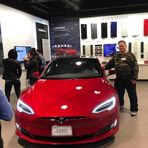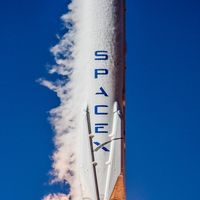The Turbulent Skies of Tesla: Musk and Trump’s Feud Sends Shockwaves Through the Market
June 7, 2025, 4:11 am

Location: United States, Texas, Austin
Employees: 10001+
Founded date: 2003
Total raised: $3.86B

Location: United States, District of Columbia, Washington
Employees: 5001-10000
Founded date: 2002
Total raised: $7.53B
Wedbush Securities
Location: United States, California, Los Angeles
Employees: 501-1000
Founded date: 1955
In the world of electric vehicles, Tesla stands as a titan. Yet, recent events have cast a shadow over its bright future. The once-cozy relationship between Elon Musk and Donald Trump has soured, sending investors into a frenzy. The fallout? A staggering drop in Tesla’s stock value, erasing billions in market capitalization.
The drama unfolded quickly. Trump, feeling slighted by Musk’s criticism of his administration’s tax policies, fired back with threats. He hinted at pulling government contracts from Musk’s companies, particularly SpaceX. This was not just a spat; it was a declaration of war. The markets reacted swiftly, with Tesla shares plummeting over 14% in a single day. Investors watched in horror as $152 billion vanished from Tesla’s market value.
Musk and Trump were once allies, two giants of industry and politics, united in their vision for America. They attended events together, basking in mutual admiration. But the tides have turned. The feud erupted publicly, fueled by social media exchanges that resembled a high-stakes game of chess. Each move was calculated, each word a potential dagger.
Analysts and investors were left reeling. The fear was palpable. With Trump at the helm, the regulatory landscape for autonomous vehicles could shift dramatically. Musk’s ambitious plans for a fleet of driverless taxis seemed to hang in the balance. The dream of robotaxis in 20 to 25 cities by next year now felt like a distant fantasy.
Dan Ives, a prominent analyst, expressed concern. The regulatory environment could tighten, stalling Tesla’s progress. The promise of a new era in transportation was now clouded by uncertainty. Investors were no longer betting on a smooth ride; they were bracing for turbulence.
Musk’s fortunes took a hit too. The day the feud escalated, he lost $20 billion in personal wealth. The stakes were high, and the consequences were immediate. The market had spoken, and it was not pleased.
Trump’s threats seemed to target SpaceX more than Tesla. The rocket company had enjoyed a lucrative relationship with the government, securing billions for missions to the International Space Station. But with Trump’s ire directed at Musk, that relationship was now under scrutiny. The political landscape was shifting, and Musk’s empire was at risk.
The fallout extended beyond the stock market. Prominent figures weighed in, urging reconciliation. Billionaire Bill Ackman called for peace, suggesting that both men should unite for the greater good. Others, however, fanned the flames. Former Trump adviser Steve Bannon suggested drastic measures, advocating for the government to seize control of SpaceX. The rhetoric was heated, and the stakes were rising.
Musk’s response was equally pointed. He reminded Trump that his election victory was, in part, due to Musk’s influence. The back-and-forth was reminiscent of a schoolyard brawl, with each side trying to assert dominance. The political implications were significant. Musk’s criticism of Trump’s policies had opened a Pandora’s box, and now both men were trapped in a cycle of retaliation.
As the feud escalated, the market reacted with fear. Investors began to question the future of Tesla. Would the regulatory environment become hostile? Would Musk’s ambitious plans for autonomous vehicles be derailed? The uncertainty loomed large, casting a shadow over Tesla’s once-bright prospects.
The broader implications of this feud are profound. Tesla is not just a car company; it’s a symbol of innovation and progress. The vision of a future filled with autonomous vehicles is a cornerstone of Musk’s strategy. But with Trump’s threats hanging over him, that vision is now clouded.
Analysts remain divided. Some maintain a bullish outlook on Tesla, believing that the company will weather this storm. Others, however, see the feud as a significant risk. The relationship between Musk and Trump was once a source of strength; now, it feels like a liability.
The world is watching. Investors, politicians, and the public are all tuned in to this unfolding drama. The stakes are high, and the outcome is uncertain. Will Musk and Trump find common ground, or will their feud escalate further?
In the end, the future of Tesla hangs in the balance. The dream of a driverless future is at risk, and the market is reacting accordingly. As the dust settles, one thing is clear: the road ahead is fraught with challenges. The once-promising partnership between Musk and Trump has turned into a battleground, and the repercussions will be felt for years to come.
In the world of electric vehicles, the skies are turbulent. Investors are left to navigate the storm, hoping for a return to calmer waters. But for now, uncertainty reigns, and the future of Tesla remains a question mark.
The drama unfolded quickly. Trump, feeling slighted by Musk’s criticism of his administration’s tax policies, fired back with threats. He hinted at pulling government contracts from Musk’s companies, particularly SpaceX. This was not just a spat; it was a declaration of war. The markets reacted swiftly, with Tesla shares plummeting over 14% in a single day. Investors watched in horror as $152 billion vanished from Tesla’s market value.
Musk and Trump were once allies, two giants of industry and politics, united in their vision for America. They attended events together, basking in mutual admiration. But the tides have turned. The feud erupted publicly, fueled by social media exchanges that resembled a high-stakes game of chess. Each move was calculated, each word a potential dagger.
Analysts and investors were left reeling. The fear was palpable. With Trump at the helm, the regulatory landscape for autonomous vehicles could shift dramatically. Musk’s ambitious plans for a fleet of driverless taxis seemed to hang in the balance. The dream of robotaxis in 20 to 25 cities by next year now felt like a distant fantasy.
Dan Ives, a prominent analyst, expressed concern. The regulatory environment could tighten, stalling Tesla’s progress. The promise of a new era in transportation was now clouded by uncertainty. Investors were no longer betting on a smooth ride; they were bracing for turbulence.
Musk’s fortunes took a hit too. The day the feud escalated, he lost $20 billion in personal wealth. The stakes were high, and the consequences were immediate. The market had spoken, and it was not pleased.
Trump’s threats seemed to target SpaceX more than Tesla. The rocket company had enjoyed a lucrative relationship with the government, securing billions for missions to the International Space Station. But with Trump’s ire directed at Musk, that relationship was now under scrutiny. The political landscape was shifting, and Musk’s empire was at risk.
The fallout extended beyond the stock market. Prominent figures weighed in, urging reconciliation. Billionaire Bill Ackman called for peace, suggesting that both men should unite for the greater good. Others, however, fanned the flames. Former Trump adviser Steve Bannon suggested drastic measures, advocating for the government to seize control of SpaceX. The rhetoric was heated, and the stakes were rising.
Musk’s response was equally pointed. He reminded Trump that his election victory was, in part, due to Musk’s influence. The back-and-forth was reminiscent of a schoolyard brawl, with each side trying to assert dominance. The political implications were significant. Musk’s criticism of Trump’s policies had opened a Pandora’s box, and now both men were trapped in a cycle of retaliation.
As the feud escalated, the market reacted with fear. Investors began to question the future of Tesla. Would the regulatory environment become hostile? Would Musk’s ambitious plans for autonomous vehicles be derailed? The uncertainty loomed large, casting a shadow over Tesla’s once-bright prospects.
The broader implications of this feud are profound. Tesla is not just a car company; it’s a symbol of innovation and progress. The vision of a future filled with autonomous vehicles is a cornerstone of Musk’s strategy. But with Trump’s threats hanging over him, that vision is now clouded.
Analysts remain divided. Some maintain a bullish outlook on Tesla, believing that the company will weather this storm. Others, however, see the feud as a significant risk. The relationship between Musk and Trump was once a source of strength; now, it feels like a liability.
The world is watching. Investors, politicians, and the public are all tuned in to this unfolding drama. The stakes are high, and the outcome is uncertain. Will Musk and Trump find common ground, or will their feud escalate further?
In the end, the future of Tesla hangs in the balance. The dream of a driverless future is at risk, and the market is reacting accordingly. As the dust settles, one thing is clear: the road ahead is fraught with challenges. The once-promising partnership between Musk and Trump has turned into a battleground, and the repercussions will be felt for years to come.
In the world of electric vehicles, the skies are turbulent. Investors are left to navigate the storm, hoping for a return to calmer waters. But for now, uncertainty reigns, and the future of Tesla remains a question mark.